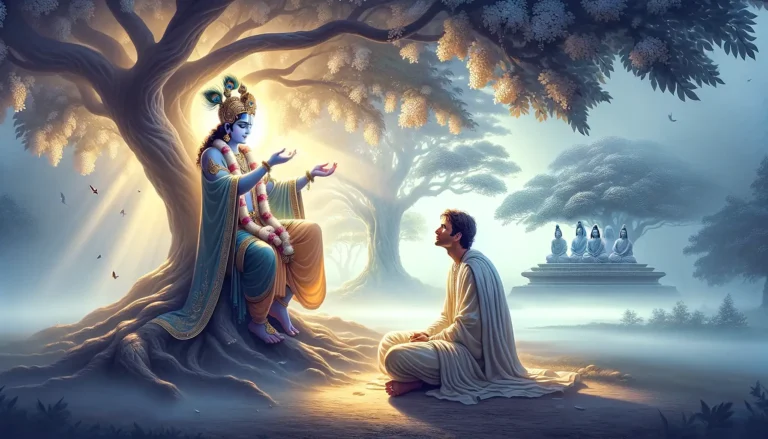The Bhagavad Gita is a part of the Indian epic Mahabharata and contains 700 verses. It doesn’t directly mention ‘depression’ in the way modern psychology does, but when we explore the topic of ‘Bhagavad Gita on Depression,’ we see that it has valuable advice for dealing with life’s difficulties. This ancient text offers insights that are still relevant today, showing us how to find inner peace and manage feelings of sadness or stress

When you see someone dealing with depression or if you’ve been through it yourself, you know it’s a really hard time. “Depression can make you feel like there’s a rain cloud over you every day. It’s like being in a dark tunnel where you can’t see the light at the end. It can suck the fun out of things you used to like and make even simple stuff feel super tough“. It’s a tough spot to be in, for sure but verses from Bhagavad Gita on Depression will surely help.
Verses from the Bhagavad Gita on Depression
The initial verse from the Bhagavad Gita on depresssion is located in Chapter 2, Verse 3
क्लैब्यं मा स्म गमः पार्थ नैतत्त्वय्युपपद्यते।
क्षुद्रं हृदयदौर्बल्यं त्यक्त्वोत्तिष्ठ परन्तप॥“
Chapter 2, Text 3
English Translation: Yield not to unmanliness, O Partha (Arjuna), it does not become you. Shaking off this base faint-heartedness, stand up, O scorcher of enemies.
In this verse, Lord Krishna emphasizes the importance of dharma (duty) and the inherent strength one must find to fulfill it. He tells Arjuna that yielding to despair and weakness does not align with his true nature or his responsibilities. Krishna encourages Arjuna to overcome his heart’s weaknesses and stand strong, ready to perform his duty as a warrior, which is his dharma. This guidance underlines the significance of adhering to one’s duty with courage and integrity, especially during challenging times.
When someone acts out of a sense of duty, many of life’s daily struggles, including questions like “What should I do?” and “Why should I do it?” become clearer. For instance, as a son, one has the duty (dharma) to look after certain responsibilities. Similarly, as a friend, there are duties to fulfill. Therefore, even on days when motivation is low, it’s important to remember the roles we play, such as being a father or a husband, and the responsibilities that come with these roles.
This mindset of adhering to our duties acts as a constant motivator, encouraging us to act and persevere through challenges, reinforcing the idea that through action, we fulfill not only our responsibilities but also find a deeper sense of satisfaction and purpose
मात्रास्पर्शास्तु कौन्तेय शीतोष्णसुखदुःखदाः। आगमापायिनोऽनित्यास्तांस्तितिक्षस्व भारत॥
Chapter 2, Text 14
English Translation: “O son of Kunti(Arjuna), the non-permanent appearance of happiness and distress, and their disappearance in due course, are like the appearance and disappearance of winter and summer seasons. They arise from sense perception, O scion of Bharata, and one must learn to tolerate them without being disturbed
In this verse, Lord Krishna tells Arjuna that feelings like being too hot or too cold, happy or sad, don’t last forever. They come and go just like the seasons change. Krishna is saying that we should not let these feelings upset us too much. Instead, we should stay calm and not let them distract us from doing what’s important. This advice helps us keep our cool and focus on our goals, even when things get tough. It’s about learning to be okay with life’s ups and downs and not letting them shake us from our path.
बहिरन्तश्च भूतानामचरं चरमेव च। सुखमबन्ध्यात्संयोगाद्भक्तियोगेन सेवते॥
Chapter 5, Text 21
English Translation: “Such a liberated person is not attracted to material sense pleasure but is always in trance, enjoying the pleasure within. In this way, the self-realized person enjoys unlimited happiness, for he concentrates on the Supreme
In this verse, the emphasis is on the joy that comes from internal fulfillment as opposed to external sensory pleasures. A person who has realized the self, or who is enlightened, finds happiness within and is thus unaffected by external circumstances, which can include the ups and downs that might lead to depression.
In simpler words, the Bhagavad Gita might not say ‘depression’, but it’s like a map for your heart. It shows you how to find the path to feeling better, even when you’re lost in the dark. It tells you that you’ve got the power to get through tough times and find a happiness that sticks around, no matter what
Also read:Bhagavad Gita on Anger Control:12 Transformative Strategies for Inner Peace
Mahabharata Family Tree Explained: Discovering the Epic’s Legendary Ancestry



